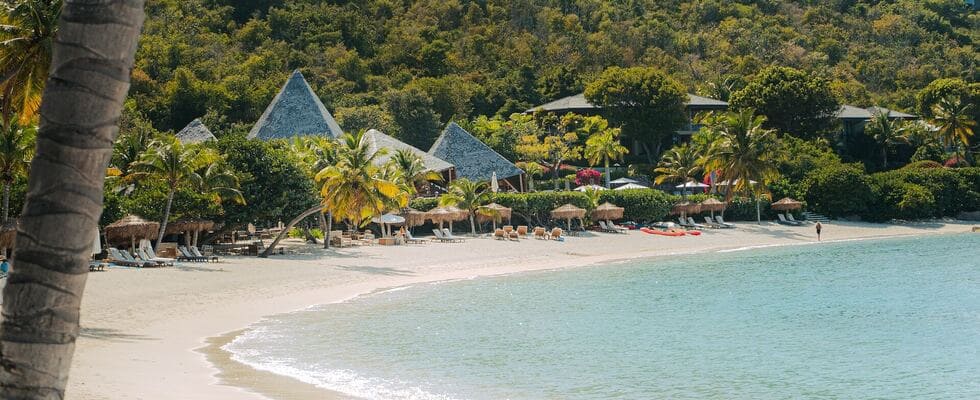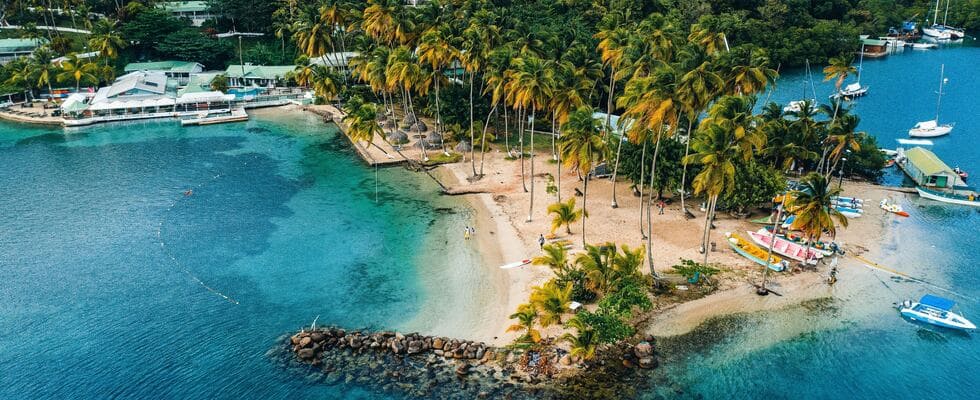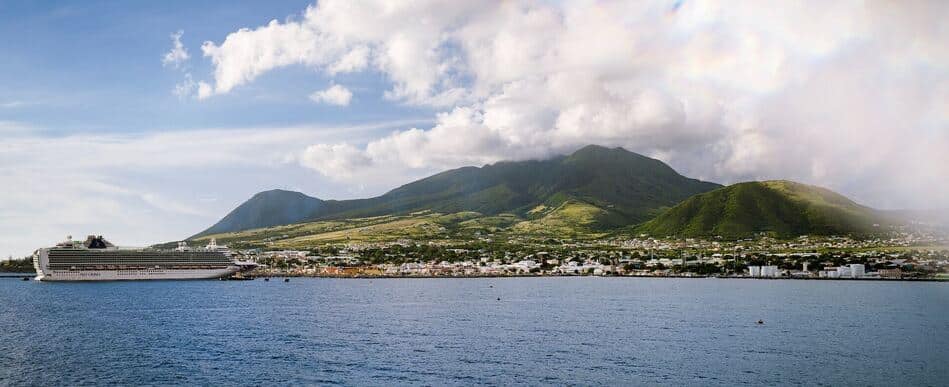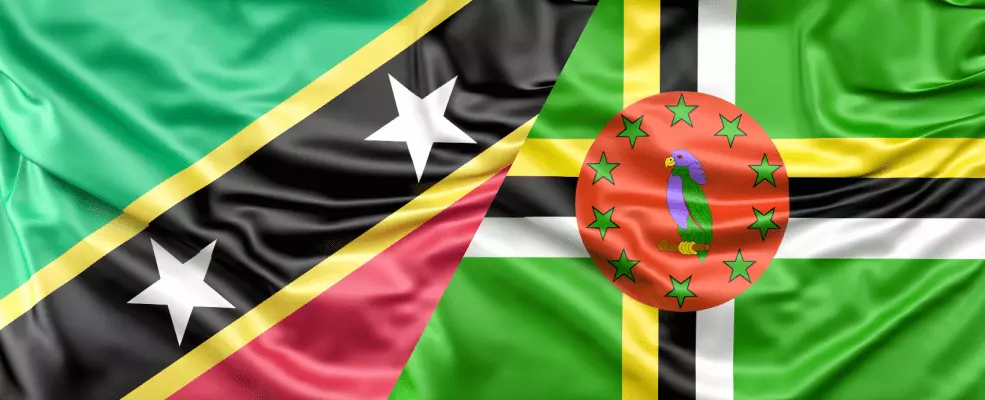Buying property in the Caribbean is an attractive option for many reasons. The region boasts year-round sunshine and a tropical climate, a bustling tourist market, a welcoming local population with a vibrant culture and rich history, and various real estate investment options across the many stunning islands in the Caribbean.
If you’re thinking of buying property in the Caribbean, this guide is for you. We’ll take you through the current Caribbean real estate market, the property investment options available, the buying process, Caribbean property prices and the associated costs you can expect, and the process of obtaining citizenship by making a real estate investment through one of the Caribbean citizenship by investment programs.
The Caribbean Property Market
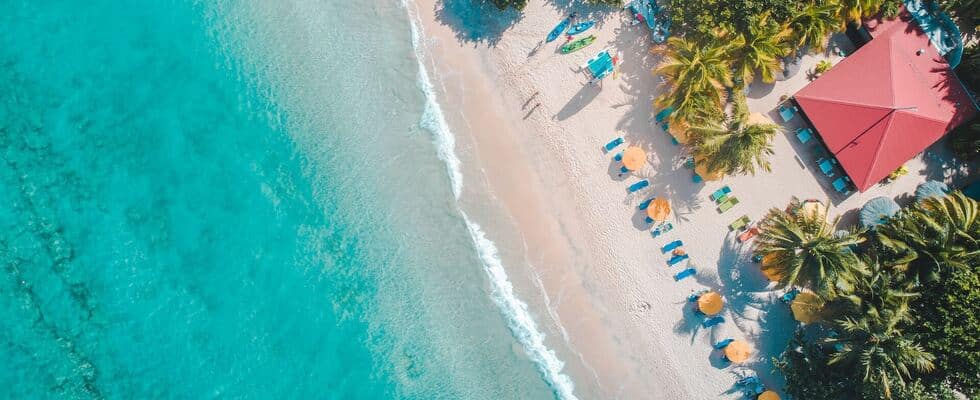
When you think of the Caribbean region, popular destinations like the Bahamas, Dominica, St Lucia, the Cayman Islands, Jamaica, and Cuba may come to mind. In actual fact, the Caribbean is made up of more than 700 islands, reefs, and cays that are grouped into 30 territories. As you may expect, legal systems, cultures, and economic and political landscapes differ across these territories.
The Caribbean real estate market sees variation across islands and territories, too. For example, the buying process differs from Caribbean island to island. While most locations have no restrictions on foreign nationals owning real estate, some may require you to obtain an Alien Landholding License (also known as a land ownership license) to do so. Five Caribbean islands – Antigua and Barbuda, Dominica, Grenada, St Kitts and Nevis, and St Lucia – offer citizenship through investment programs that allow foreign buyers to obtain second citizenship by making Caribbean real estate investments.
Generally speaking, the Caribbean has a thriving tourism industry that foreign investors are eager to take advantage of by investing in Caribbean property. Government initiatives aimed at attracting foreign investment in the country have further enhanced its appeal to overseas buyers. The Caribbean property market has seen an increased demand for luxury properties, driven by the desire for exclusivity, a private dwelling, and the unique island life offered in the Caribbean.
The region has also seen an increased focus on more sustainable real estate developments, with residential real estate dominating the market. As the region is a tropical paradise with year-round warm weather, sandy beaches, a vibrant local culture, diverse expatriate and retirement communities, and a myriad of investment opportunities, it’s easy to see why the Caribbean is a popular location for tourists, digital nomads, retirees, families, and investors.
Caribbean Citizenship by Investment
One of the biggest draws of the Caribbean is the option to make a Caribbean property investment and obtain Caribbean citizenship. Five Caribbean countries, including Dominica, Antigua and Barbuda, Grenada, St Kitts and Nevis, and St Lucia, offer second citizenship to investors who buy properties in approved projects, with the added benefit of accessing a rental program to generate income.
Pros and Cons of Buying Property in the Caribbean
There are advantages and disadvantages to purchasing property abroad, and the Caribbean is no different. In this section, we’ve outlined a few pros and cons for you to consider when making your Caribbean real estate purchase.
Pros
Affordability: Islands like Dominica, the Dominican Republic, and Grenada have a low cost of living without compromising the quality of life enjoyed there. From low-cost local produce to budget-friendly properties, this is an appealing factor for any foreign buyer.
Tourism industry: The Caribbean is popular destination for everyone from digital nomads to retirees. It’s thriving tourism industry provides ample opportunity for eager investors to enjoy a profitable rental yield from short and long-term rental properties located in tourist hotspots.
Cons
Natural disasters: Certain areas in the Caribbean are prone to natural disasters, such as earthquakes, hurricanes, and volcanic eruptions. Hurricane season especially is an important factor for foreign buyers to consider when choosing where to invest in the Caribbean, as it can result in property damage and unexpected repair costs.
Living costs: While many Caribbean nations offer their inhabitants a more affordable lifestyle, places like Barbados, the Bahamas, and the Cayman Islands have a higher cost of living. This price tag does come with a high standard of living, which is attractive to many.
Caribbean Property Prices

The cost of property in the Caribbean will depend on several factors: The type of property (apartment, condo, luxury villa, family home), its size, and its location. Some Caribbean islands are more expensive than other Caribbean islands, and prices of property tend to be more affordable the further away you move from the city center.
The best way to get an idea of current property prices in the Caribbean is to conduct a search through real estate websites. You can use keywords, such as ‘beachfront property Antigua and Barbuda’ or ‘two-bedroom apartment British Virgin Islands’ to ensure the results align with what you are looking for. You can also use the search filters on the website to streamline your search in terms of budget, location, size, amenities, etc.
Fees and taxes when buying real estate
It is important to factor in the additional costs – such as real estate insurance and legal fees – you will encounter when investing in real estate abroad, not only during the buying process but in maintaining the property, too. The specific taxes and fees associated with buying Caribbean real estate will vary depending on the country in which the property is located.
The following section highlights some common taxes and fees you may encounter when investing in Caribbean real estate:
Property taxes
Most Caribbean islands levy property taxes for real estate ownership. The specific amount will be based on the value of the property and the local property tax rates, which generally range from 0.002 percent to five percent.
Stamp duty
Stamp duty is a government tax levied on real estate transactions, such as when you purchase property. The stamp duty rate varies depending on the island and the property’s value, generally ranging between zero and four percent.
Income tax
If your real estate or investment property is intended to be a rental property, you will likely be charged income tax on the rental income earned. Of course, the rate will vary depending on the Caribbean island and the amount of rental income earned.
Capital gains tax
If you buy property in the Caribbean with the intention of selling it for a profit, you will likely need to pay capital gains tax. Again, the rates will vary across the Caribbean islands and the amount of profit earned.
Value Added Tax (VAT)
Some Caribbean islands will levy value-added tax (VAT) when real estate is sold. As with other taxes, the VAT rate varies across the islands and often depends on the property value.
To ensure that you know exactly what taxes you will need to pay when making a real estate investment in the Caribbean, you should consult with a reputable local accountant, lawyer, or tax advisor. They will have expert knowledge of the tax and legal systems specific to the Caribbean region you are interested in and will understand the specific tax obligations you will need to adhere to when owning Caribbean real estate.
Taxes and fees when buying Caribbean real estate
Country | ALHL cost | Stamp duty | Other taxes | Minimum investment under CBI program |
Antigua & Barbuda | 5% | 2.5% | – | $200,00 |
Dominica | 10% | 1% | 10% transfer tax (properties over $7,500) | $200,00 |
Grenada | 10% | 4% | 3.5% | $200,00 |
St Kitts & Nevis | 10% | – | 0.2% | $400,00 |
St Lucia | $2,300 – $4,200 depending on site area | 2% | – | $200,00 |
Caribbean Real Estate – What options are available?

The types of properties available in the Caribbean can vary depending on the island and the local real estate market. However, some common types of properties that can be found in the Caribbean include:
Beachfront villas: A luxurious beachfront villa located right on the golden sands of one of the most beautiful beaches in the world may sound too good to be true, but not in the Caribbean. Waterfront real estate with breathtaking ocean views and private access to the beach is widely available.
Condominiums: This type of Caribbean home is generally found in high-rise buildings and can range from simple, affordable condos to luxurious, high-end condos with a view of the Caribbean Sea. Condominiums make ideal vacation homes, family homes, or even investment properties in rental programs that provide rental income.
Luxury homes: A luxury Caribbean home may be your dream property, and for good reason. The Caribbean is known for its luxury real estate and lifestyle. These properties are typically larger, with modern, high-end finishes and amenities such as private pools, tennis courts, and ocean views. They take the form of luxury villas, boutique hotels, private island retreats, luxury estates, and more.
Apartments: These are typically smaller units that tend to offer convenience, proximity to beaches and other attractions, and beautiful views of the island. Apartments range in price from expensive to more affordable properties depending on the location, size, amenities, etc. An apartment also tends to be a great investment property, particularly for foreign buyers looking to diversify their asset portfolios and earn rental income and travelers looking for a lock-up-and-go.
Commercial properties: These can include hotels, resorts, and commercial spaces such as restaurants, shops, and offices. A particularly good option for those looking to make a business or real estate investment under one of the Caribbean citizenship by investment programs.
Land: If you find that your Caribbean property search does not yield the results you want, undeveloped land is also available for sale. These plots can be used to build a dream home to your exact specifications or develop a commercial property.
Overall, the Caribbean offers a wide range of real estate options for buyers with varying budgets and preferences. It’s important to work with a reputable real estate agent who can help you navigate the local market and find the property that best suits your needs.
What is the cheapest island to buy Caribbean real estate?
When purchasing property anywhere, budget is often one of the most important factors. When buying real estate to relocate to a new country, budget is even more of an essential factor. Fortunately, the Caribbean offers a variety of property types at a range of prices, meaning you’re likely to find something that meets your budgetary requirements without compromising your quality of life.
The best Caribbean islands to find affordable properties are St Vincent and the Grenadines, the Dominican Republic, and Jamaica without compromising the value you can get for your money. For example, the price per square meter to purchase an apartment in the Dominican Republic can range between $1,011 and $1,442, while in Jamaica, this can cost anywhere between $2,210 and $2,570 per square meter. If you are buying property in the Caribbean as part of a citizenship by investment program, Grenada is the cheapest island, with an average price of $2,000 per square meter.
Of course, we highly recommend speaking to a real estate agent or buyer’s agent during your property search. Real estate agencies have professional contacts within the local network and are familiar with the local markets, enabling them to provide expert advice tailored to your needs.
Calculate the cost of citizenship for you and your family, including all associated fees.
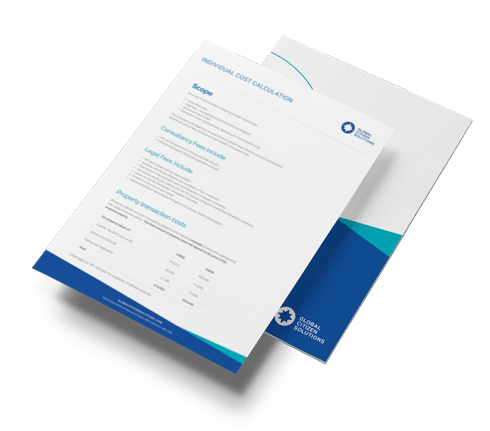
Can foreigners buy property in the Caribbean?
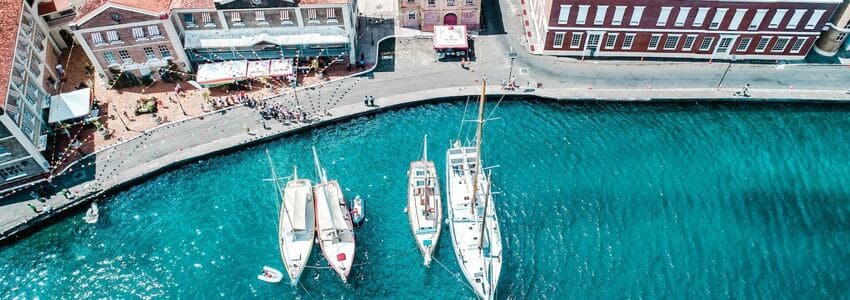
A great benefit of a vacation home in the Caribbean is that most locations here allow foreigners to purchase property. What you will have to look for, however, is whether your chosen area in the Caribbean has any specific restrictions in place or bureaucracy that may extend the timeline of the purchasing process.
Your next consideration should be how you will finance the property purchase and any fees you may incur (as outlined above). If you use a lawyer or real estate agent, you will need to factor in legal fees, service fees, commission, and transfer taxes in addition to the property’s purchase price.
Another aspect to consider is a mortgage. If you want to take out a mortgage to purchase your Caribbean property, you will require pre-approval from your lender before starting your search for Caribbean real estate, which could delay the process slightly.
Your first step will be to determine the right lender for you, as there are several that offer mortgages to foreign buyers in the Caribbean. Mortgage loans typically last for 15 to 20 years, with lenders considering factors such as your country of residence, the property’s price, the island on which the property is located, and the loan-to-value (LTV) ratio.
As the buying process may vary from island to island, it is essential to employ the services of a lawyer who has expert knowledge of the real estate laws and processes specific to the island on which your property is located.a
The Process of Buying Property in the Caribbean
As mentioned at the start, there are economic, political, and cultural differences across the Caribbean region. Another aspect that varies is the process of buying property in the Caribbean. This is due to the influence of legislation from different countries.
For example, the buying process in English-speaking countries such as Antigua, Barbados, and St Lucia are influenced by English law. However, the buying process in the French Caribbean areas such as St Barts, St Martin, and Martinique is not influenced by English law but by the general procedures found in France.
It can be tricky to navigate these differences, which is why we recommend consulting with an attorney who is familiar with the purchasing process specific to your chosen area. They will be able to provide professional guidance and advice tailored to your circumstances before you take the next step in the purchase of a property.
Generally speaking, the process will look something like this:
- Obtain an Alien Landholding License
- Conclude an agreement on the property reservation
- The buyer puts down a deposit of ten to 15 percent of the property price
- A Sale and Purchase Agreement is drawn up
- All contracts are signed in front of a notary and the remainder of the funds are paid
- The property is registered with the local land department
Buying property for citizenship by investment
As mentioned above, there are five Caribbean countries with citizenship by investment programs: Antigua and Barbuda, Dominica, Grenada, St Kitts and Nevis, and St Lucia. The process of buying approved real estate through these programs requires you to work through an Authorized Agent, who will guide you through the available investment options and make your application on your behalf.
The general process is as follows:
- Choose your investment property under the citizenship program
- Gather documents and complete application forms
- Submit your application through your Authorized Agent, such as Global Citizen Solutions
- Receive approval from the Citizenship by Investment Unit (CIU)
- Make your investment and send confirmation to the CIU
- Be granted citizenship and receive your passport
You can read more in our guide to Caribbean Citizenship by Investment.
Why work with Global Citizen Solutions?

- Global approach by local experts. We are corporate members of the Investment Migration Council, with local expertise in all five Caribbean citizenship programs.
- 100 percent approval rate. We have never had a case rejected and will offer you an initial free-of-charge due diligence assessment before signing any contract.
- Independent service and full transparency. We will present to you all the investment options available, and all expenses will be discussed in advance, with no hidden fees.
- An all-encompassing solution. A multidisciplinary team of immigration lawyers, investment specialists, and tax experts will take into consideration all your and your family's mobility, tax, and lifestyle needs.
- Confidential service and secure data management. All private data is stored within a GDPR-compliant database on a secure SSL-encrypted server.
Get in touch with a Caribbean Citizenship by Investment specialist
Frequently Asked Questions about Buying Property in the Caribbean
Yes, a US citizen can buy property in the Caribbean. The Caribbean welcomes foreign property ownership in the country, so you will only need to check whether your chosen area in the Caribbean has any specific restrictions or bureaucracy that can extend the time it takes to complete the purchasing process.
Many US citizens own property in many islands and countries in the Caribbean, including Costa Rica, St Kitts and Nevis, the Turks and Caicos Islands, and the US territories of Puerto Rico and the US Virgin Islands.
As there are numerous countries and territories in the Caribbean, the procedures for buying property in Caribbean islands can vary. Most locations simply require prospective residents to register with a central bank. Some islands restrict residency, while others offer citizenship in return for making a real estate investment. This is possible under the citizenship by investment programs offered by five Caribbean countries: Antigua and Barbuda, Dominica, Grenada, St Kitts and Nevis, and St Lucia.
In addition to the purchasing price, which will vary depending on the purchase agreement, property type, size, location, etc., you will need to pay various fees and taxes. This includes but is not limited to, stamp duty, agent fees, lawyer fees, transfer tax, and so on. If you do not purchase property as part of a citizenship by investment program, you will need to obtain an Alien Landholding License (ALHL) as a foreign buyer, which can cost between five percent and ten percent of the property prices, depending on the country/territory.
Cuba and Haiti often come to mind when considering the best Caribbean island to buy property due to their low real estate prices. However, countries like Antigua and Barbuda, Dominica, Grenada, St Kitts and Nevis, and St Lucia offer the option of obtaining citizenship through property investment under their citizenship by investment programs, which appeals to many overseas buyers. Ultimately, the best Caribbean country for property investment will depend on your individual needs.
St Barts, St Maarten, and the Turks and Caicos Islands are considered some of the safest place to buy property in the Caribbean due to their low crime rates, political stability, and stable property markets.
Buying property in Caribbean islands can be worth it for numerous reasons. While real estate prices in the Caribbean varies, some of the cheapest islands to purchase property in the Caribbean present lucrative opportunities to earn significant returns on investment.
If you’re considering moving to the Caribbean, owning property in the Caribbean allows you to enjoy the region’s year-round warmth. There’s also the opportunity to obtain second citizenship for foreign nationals who buy real estate in the Caribbean through programs, including the Grenada and St Kitts and Nevis citizenship by investment programs.
There are several tax benefits for property owners in the Caribbean. For example, many Caribbean islands do not levy capital gains or inheritance taxes. Tax benefits will depend on the tax policies of the Caribbean island.
A major consideration when buying property in the Caribbean is the weather. The Caribbean is a tropical paradise that can experience natural disasters such as hurricanes and earthquakes. So, when choosing where to buy your vacation home or beachfront villa, it is essential to assess whether the location is prone to severe weather that may result in damage to your property and unexpected costs down the line. Fortunately, several Caribbean islands, including Grenada and Barbados, are not prone to severe weather such as hurricanes.
Some of the cheapest islands in the Caribbean to buy property are Dominica, St Lucia, and the Dominican Republic. Buying land in the Caribbean is also an option to buy own cheap property.
Many Caribbean islands are focusing on sustainable development practices in real estate, which may be a consideration for some investment properties. Certain islands prohibit foreigners and citizens from owning property or land in protected areas. However, specific environmental regulations will depend on the different Caribbean destinations.

